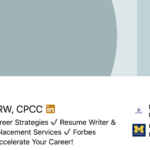iStockphoto.com | Bohdan Skrypnyk When it comes to building an effective resume, the basics matter.Two recent, very real, resumes reminded us that even great candidates with years of experience can have resumes that look like an afterthought. These resumes broke every rule and were replete with errors unacceptable for a professional resume - or any …


iStockphoto.com | Bohdan Skrypnyk
When it comes to building an effective resume, the basics matter.
Two recent, very real, resumes reminded us that even great candidates with years of experience can have resumes that look like an afterthought. These resumes broke every rule and were replete with errors unacceptable for a professional resume – or any professional document, really. To be clear — there is no friendly audience for a resume with basic mistakes. Fair or not, in the mind of the recruiter or hiring manager, a sloppy resume can translate to the perception of a sloppy worker – and sloppy workers don’t get hired.
Here are some instant resume deal-breakers to avoid like the plague:
-
Punctuation errors. If you don’t end a sentence with a period, the perception is that you either do not know basic grammar or you did not bother to proofread your resume.
-
Misspelled words. You live in an era when a machine will check your spelling for you. The process is effortless. Combined with the aforementioned “proofreading,” there should never be a misspelled word in a resume.
-
Verb Tense Disagreement. If you are working, your current position’s description should be written in active present tense. Be consistent.
-
Using “I”. Your resume is not an auto-biography. It’s not even a work biography. It’s a marketing brochure with a singular goal — land the interview so you can tell your story in person and get hired. Your resume should not be personal and should be pronoun free, starting with “I”.
-
Non-uniformity. No matter what formatting style you choose, it should be used throughout the document. For example, if you choose to describe your work history with one or two lines followed by three bullet points, make sure ALL the positions have bullet points. You shouldn’t have half with bullet points and half with small paragraphs.
-
Difficult to read. Even if your resume is the greatest resume ever written, it may be the 25th resume a recruiter has looked at in a given day and if it looks insurmountable – dense paragraphs, overly complicated verbiage – they won’t want to bother.
-
Insufficent White Space. White space is the space that contains no text, and it should be used generously. A resume should not look like a series of big, gray, long paragraphs. The intelligent use of separating important details about your achievements, work history, and skill sets more effectively communicates your professional brand. Scannability by the reader is the name of the game.
-
Repeating information. Every line of a resume is prime beachfront real estate that must be developed with the utmost care. Don’t waste precious space with the exact same thing instead of highlighting your many successes. Show something new throughout the text.
-
Being insufficiently specific. For example, “prepared reports for managers”, is generic, uninteresting, and does not help you. What type of reports? How often? Why? Now you have, “Prepared critical monthly investment reports for C-level executives who relied on data to make high-level long term strategic decisions for global operations.” Much better. I think I know more about who you are now.
-
Including too much personal information. Age and marital status come to mind. And for security reasons, do not put your full home address on your resume – your city, state, and zip code (optional) will suffice.
Philip Roufail contributed to this article.
Scott Singer is the President and Founder of Insider Career Strategies Resume Writing & Career Coaching, a firm dedicated to guiding job seekers and companies through the job search and hiring process. Insider Career Strategies provides resume writing, LinkedIn profile development, career coaching services, and outplacement services. You can email Scott Singer at scott.singer@insidercs.com, or via the website, www.insidercs.com.





